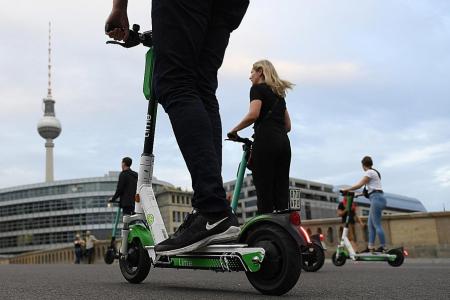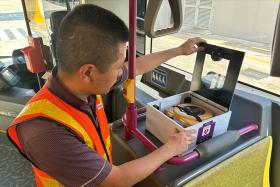Other countries also facing problem PMD issue
Singapore is not alone in facing problems with PMD use - France, Germany, Denmark and Australia also tackling issue
The death of cyclist Ong Bee Eng last month after a collision with an e-scooter has put the bad behaviour of personal mobility device (PMD) users under scrutiny.
In Parliament on Oct 7, Senior Minister of State for Transport Janil Puthucheary warned that the Government may have no choice but to ban PMDs if the situation does not improve.
But Singapore is not alone in grappling with this issue.
In Paris, shared e-scooters littered the sidewalks and caused a spate of accidents.
In Queensland, Australia, an e-scooter rider's death in May also sparked calls for a ban.
The New Paper looks at how these jurisdictions are tackling the problem.
QUEENSLAND
When Singapore's Active Mobility Advisory Panel made its latest recommendations on safe PMD use last month, it cited current rules in Queensland, where riders must be at least 16, or 12 if there is adult supervision.
The Australian state has taken a similar approach as Singapore by allowing e-scooters and other "rideables" on footpaths.
In response to TNP's queries, its Department of Transport and Main Roads said PMD users are particularly vulnerable when interacting with traffic.
"Access to roads would create unsafe interactions between rideables, bikes and vehicles, exposing rideable users to an unacceptable risk and increasing risks for bike riders," said a spokesman.
Under laws introduced last December, PMDs are banned on main roads, roads in central business districts, and on-road bike lanes, but can be used on local streets, if safe to do so.
Users must keep left, give way to pedestrians, wear a bicycle helmet and cannot carry a pillion.
Despite a safety campaign to curb e-scooter injuries, Queensland has not been spared errant riders and accidents, though - unlike in Singapore - most use shared devices.
In May, the death of a 50-year-old rider, believed to be the first e-scooter fatality in Australia, led to calls for a ban from a pedestrian safety group.
The Department of Transport and Main Roads spokesman told TNP it continues to monitor rideables development, but is not currently reviewing the laws.
FRANCE
Like the US state of California, France has banned e-scooters from sidewalks.
After a public backlash last month, e-scooters can be used only on tracks and bicycle lanes in urban areas. Elsewhere, they may be used on roads at speeds of 50kmh or slower.
French authorities said the new rules will make it possible to tackle errant rider behaviour.
But data and research are needed to see what effect the increasing use of e-scooters will have on road safety, said a report by the European Transport Safety Council (ETSC).
A media report in August said three deaths have been linked to e-scooter use in four months in the Paris region.
GERMANY AND DENMARK
In these two European nations, where e-scooters are also banned from sidewalks, drunk riders have become a problem, with Danish police arresting 28 people over a weekend in July for riding while under the influence of drugs and alcohol.
The ETSC said it is important that states define traffic regulations on space sharing - whether e-scooters should compete for space on pavements, share cycling paths, or use roads with motorised traffic.
ETSC spokesman Dudley Curtis told TNP: "As with many issues in road safety, we don't have one simple answer... There is not one policy that is going to make these things safer."
Get The New Paper on your phone with the free TNP app. Download from the Apple App Store or Google Play Store now



